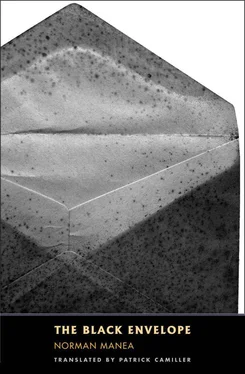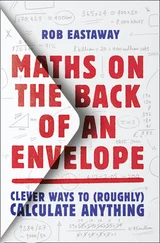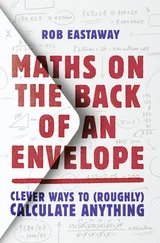His wife stared at him without smiling. She was used to his obsession for linking the day’s events to his research in the library. She knew his habit of returning again and again to things that happened forty years ago. This time, though, there was something special in his voice. It seemed like a crowning moment, a final and decisive test that she did not understand. But she did understand his excitement — a kind of unexpected victory and, yes, panic. A long-suppressed panic that both confirmed his expectations and gave him new life, as it were.
An hour later, then, Mr. Matei Gafton was asking the librarian for more volumes than usual and, for some strange reason, stood with a blank look for a long time before touching the piles in front of him. But he did check them, carefully. Decree No. 966 of April 7, 1941, introducing harsher penalties for the crime of high treason and espionage. Plumyene and Lasierra, Les fascismes français; General Ion Antonescu, The Basis of the National-Legionary State , September — October 1940; Lucre¸tiu P  tr
tr 
 canu, Under Three Dictatorships , reissued, Bucharest 1970; The Graziani Trial , Rome, 1948–1950; Decree No. 966 of April 7, 1941, prohibiting the marriage of civil servants with foreigners or Jews; Nazi Conspiracy and Aggression , Washington, 1946. . He knew them all: they no longer satisfied him. The epidemic spread, the confusion — so many deceptive little hopes, until the invisible trap snaps shut and it is too late, with nothing more to be done. Yesterday the disease was still next door or at the next door’s neighbor; today it is inside you and it is too late. The roots of evil are in each prisoner not just in the butchers. Hunters and victim, fire, a kind of lynching, and the pretexts do not matter in the slightest: it could have been anyone at all.
canu, Under Three Dictatorships , reissued, Bucharest 1970; The Graziani Trial , Rome, 1948–1950; Decree No. 966 of April 7, 1941, prohibiting the marriage of civil servants with foreigners or Jews; Nazi Conspiracy and Aggression , Washington, 1946. . He knew them all: they no longer satisfied him. The epidemic spread, the confusion — so many deceptive little hopes, until the invisible trap snaps shut and it is too late, with nothing more to be done. Yesterday the disease was still next door or at the next door’s neighbor; today it is inside you and it is too late. The roots of evil are in each prisoner not just in the butchers. Hunters and victim, fire, a kind of lynching, and the pretexts do not matter in the slightest: it could have been anyone at all.
It would be too simple an explanation, really too simple. That spring is to blame? Spring, like forty years ago? A delayed encounter of which you are no longer capable, exhausted from adapting to so many snares, at every moment. The pretext — who would believe it— was cats!
“Are you leaving already?” The blonde behind the library counter was evidently intrigued.
He shrugged his shoulders, feeling guilty.
He sauntered along the boulevard. Spring. Words. Spring made up of words. Trotyl. Dust. Red. Cherry. Delicate buds as in an advertisement. A dog and a cat. Blows, fire, hooligans, crowbars, destruction of the apartment, the blaze. Earth, air, water, and fire. Oxygenization, aphrodisiacs, aggression, the venom of loneliness. Spring, roll of words.
He sat down on a bench in the small dusty park. Words: the mind is forever producing words; you hear them flowing all the time inside you. Destruction. Fire. Crowbars, blows. Spite. Red. Crematorium. Mayflies. The look and the body of mayflies. Magnetic encounters, the grating silk, morbid idylls, night breeze. The fancies of tiredness wrapped him in words, as in a protective film. Absent moments — he knew the danger of such senile flights.
Maybe he should go to Tolea’s, to show him the magazine. Tolea’s reactions are childish and unpredictable: they mimic vitality well and even radiate a kind of therapeutic irritation. He might start shouting or cursing, or set the magazine alight, or quite simply throw him out as an intruder. Well, it’s hard to say who the intruder is. After all, Tolea, not he, is the tenant. So yes, it would be good to visit Tolea, especially since I don’t do it very often; the tenant would have no reason to complain. Not very often — but then the last time was just yesterday.
He had knocked timidly. No answer. But Tolea was home. He felt that Tolea was in but did not want to open the door. He knocked again, once, twice, then cautiously opened the door. Mr. Tolea Voinov barely turned his head. He seemed to recognize the intruder but did not honor him with any gesture. The man remained at the door, unsure whether to enter. The waiting lasted only a moment. The host cut through the air with his legs and bounded straight up to the guest.
“So, old fellow! Just as well you’ve come.”
Bowing down to the ground. Then a step sideways to make room for the eminent guest, who decided on the only possible course: he smiled. He looked at the professor and beamed. Yes, the tenant was the same. White ribbed trousers, white sweater, white tennis shoes. Shaven, bald, fresh. Yes, there was no mistaking him. He sat down on one of the two chairs in the tiny room.
“I’ve got bad news.”
“Thank God!” The professor crossed himself. “Let it all out, then. I’ll offer you a coffee as a reward. Get it off your chest, panie! You’ll have a real coffee, hundert prozent , not like the piss that’s drunk in our multilaterally developed society. If the news is serious — I mean, bad — you’ll get a super-coffee, straight from Allah’s kettle.”
He circled around the pigsty, among books, ties, notebooks, shopping bags, and like a conjurer fished a thermos and cup out of thin air. There was the coffee. A big, green, full cup on the metal table between the two chairs.
“Just for me?”
“I’ve already drunk a tankful; my pistons are racing away. Sip it slowly — don’t rush. Relax while you’re getting the calamities ready. I’m all yours today, Citizen Matei. You found me in — my tough luck.”
The guest sipped, smiled, put it off.
“To make it easier for both of us, let me do the explaining,” the professor began impatiently. “Let me tell you what it’s about. Otherwise you’ll keep beating around the bush all the way to Katmandu. Come on, out with it: you need this room. I’ve got to free the burial chamber. Yes?”
The guest nearly choked on his drink.
“No, no, not at all. What I was going to say was that big staff cuts are in the offing. What’s in your file will count. As in the fifties. That’s it: losing your job isn’t a joke. And as you see, there’s no longer any way I can help you.”
He spewed it all out and breathed a sigh of relief. A long silence followed — a kind of crumbling, a loss of contact.
Finally, the professor’s voice. Sharp, rejuvenated.
“As a pensioner you take an interest in all sorts of monkey business, isn’t that right? I’ve heard that you write to the authorities every day. Is it to atone for your sins of the fifties? You were a journalist in those days and you scribbled any old lie they wanted, plus a lot they maybe didn’t even ask you for but which you believed. Now you’re trying to make up for the past. So you write demands, appeals, suggestions. You criticize and notify and propose. A volunteer, a really stubborn journalist! Brave, ready to help us poor sinners. You were saying that political files are back, like in the fifties? But that things won’t repeat themselves? Then why don’t you write all that down? Nowadays courage is not such a big thing, and the pension arrives every month. You help us sinners, isn’t that right? Maybe you’ll find me another job. After all, a century ago you were at the Polytechnic together with my brother, now an Argentinian citizen living in that madhouse called Buenos Aires. One of the most beautiful in the world, says our friend Marga. And he knows about these things, working in a madhouse himself.”
The guest was bent over, the cup still in his hand. But Tolea was not looking at him.
“What do you want me to do? To ask your Argentinian colleague for help? To ask my charming brother? For charity? The boss has gone kaput, you know. What’s to be done? Swimming pool, car, farm, house, bank accounts, holidays — it’s all very tiring. Shall I write to him about childhood years, the fireplace, the parental home? Tears will flow and he’ll be off to see a psychiatrist.”
Читать дальше

 tr
tr  canu, Under Three Dictatorships , reissued, Bucharest 1970; The Graziani Trial , Rome, 1948–1950; Decree No. 966 of April 7, 1941, prohibiting the marriage of civil servants with foreigners or Jews; Nazi Conspiracy and Aggression , Washington, 1946. . He knew them all: they no longer satisfied him. The epidemic spread, the confusion — so many deceptive little hopes, until the invisible trap snaps shut and it is too late, with nothing more to be done. Yesterday the disease was still next door or at the next door’s neighbor; today it is inside you and it is too late. The roots of evil are in each prisoner not just in the butchers. Hunters and victim, fire, a kind of lynching, and the pretexts do not matter in the slightest: it could have been anyone at all.
canu, Under Three Dictatorships , reissued, Bucharest 1970; The Graziani Trial , Rome, 1948–1950; Decree No. 966 of April 7, 1941, prohibiting the marriage of civil servants with foreigners or Jews; Nazi Conspiracy and Aggression , Washington, 1946. . He knew them all: they no longer satisfied him. The epidemic spread, the confusion — so many deceptive little hopes, until the invisible trap snaps shut and it is too late, with nothing more to be done. Yesterday the disease was still next door or at the next door’s neighbor; today it is inside you and it is too late. The roots of evil are in each prisoner not just in the butchers. Hunters and victim, fire, a kind of lynching, and the pretexts do not matter in the slightest: it could have been anyone at all.










